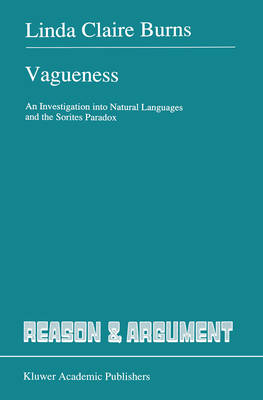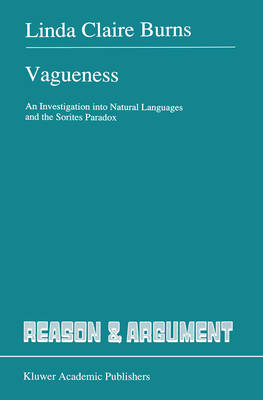
Bedankt voor het vertrouwen het afgelopen jaar! Om jou te bedanken bieden we GRATIS verzending (in België) aan op alles gedurende de hele maand januari.
- Afhalen na 1 uur in een winkel met voorraad
- In januari gratis thuislevering in België
- Ruim aanbod met 7 miljoen producten
Bedankt voor het vertrouwen het afgelopen jaar! Om jou te bedanken bieden we GRATIS verzending (in België) aan op alles gedurende de hele maand januari.
- Afhalen na 1 uur in een winkel met voorraad
- In januari gratis thuislevering in België
- Ruim aanbod met 7 miljoen producten
Zoeken
Vagueness
An Investigation Into Natural Languages and the Sorites Paradox
Linda Claire Burns, L Burns
€ 167,95
+ 335 punten
Omschrijving
I-Puzzles Problems and Paradoxes.- One Conceptions of Vagueness.- 1.1 Frege's Metaphor and The Sorites Paradox.- 1.2 The Vehicle of Vagueness.- 1.3 Something Else to do with Vagueness.- 1.4 Intensional and Extensional Vagueness.- 1.5 Commitments.- 1.6 Fregean Vagueness.- 1.7 The Evidence for Fregean Vagueness.- 2 Linguistic Behaviour.- 2.1 The Myths of Consensus and Determinacy.- 2.2 Statistical Regularities and Semantic Determinacy.- 2.3 Vagueness and Convention.- 2.4 Vagueness and Truth Theory.- 3 Approaches to Vagueness.- 3.1 Borderline Cases, Bivalence and Higher Order Vagueness.- 3.2 Bivalence and Excluded Middle.- 3.3 Vagueness and Logic.- 3.4 Supervaluations.- (a) Specification Spaces.- (b) External Penumbral Connexions and Uncertainty.- (c) Internal Penumbral Connexions and the Sorites.- 3.5 Approaches to Higher Order Vagueness.- (a) Fuzzy Logics.- (b) The Specification Space Approach.- (c) The Generation of Higher Order Vagueness.- II-The Sorites Paradox.- 4 The Paradox.- 4.1 The Incoherence Thesis.- 4.2 Wright's Arguments for Tolerance.- 4.3 Versions of the Paradox.- 4.4 An Empirical Assumption.- 4.5 Dummett's View of the Paradox.- 4.6 Ad Hoc Stipulation and Inconsistent Rules.- 4.7 Causal Explanations of Consistency.- 4.8 Wright's Conclusions.- 5 Responses to the Paradox.- 5.1 The Elimination of Vagueness.- 5.2 Ideal Languages, Logic and Precision.- 5.3 Rejecting Common Sense.- 5.4 Rejecting the Induction Step.- 5.5 Rejecting the Principles of Classical Logic.- 5.6 Austerity Measures.- 5.7 Paradigm Exemplars and Knowledge of Tolerance Rules.- 5.8 Vagueness and Contextual Disambiguation.- 6 A Solution to the Paradox.- 6.1 Tolerance Principles and Pure Observationality.- 6.2 Counter-examples to Tolerance.- 6.3 A Reply, and a Review of the Nature of the Sorites Series.- 6.4 Revising Tolerance Rules.- 6.5 A Way Out of the Paradox.- 6.6 Strict and Loose Tolerance Rules.- 6.7 A Parallel with the Grue Paradox.- 7 Further Problems and Puzzles.- 7.1 Is Indiscernibility Tolerant?.- 7.2 Is Indiscernibility Vague?.- 7.3 Inconsistency without Paradox.- 7.4 Patches in Pairs.- 7.5 The Size of the Difference.- 7.6 A Review of the Criteria of Justification.- 7.7 Conceptual and Metaphysical Miracles.- 7.8 Vagueness and Pure Observationality.- 8 Vagueness and Perception.- 8.1 A Puzzle about Perception.- 8.2 Phenomenal Qualities and Observational Predicates.- 8.3 Change of Aspect.- 8.4 Tolerance and Observationality.- 8.5 Vagueness in Perception.- 9 Conclusions.- 9.1 The Induction Step and Continua in Nature.- 9.2 The Existence of Fregean Vagueness.- 9.3 Constraints on Observer and Theorist.- 9.4 Fregean Vagueness, Loose Tolerance Rules and Undecidability.- 9.5 Vagueness as a Pragmatic Phenomenon.- 9.6 Tolerance and the Actual Language Relation.- 9.7 Bivalence, Vagueness and Truth.- 9.8 Vagueness in Language and in Psychological Phenomena.- 9.9 Vagueness, Precision and Context-Dependence.- 9.10 Classification Ranges.
Specificaties
Betrokkenen
- Auteur(s):
- Uitgeverij:
Inhoud
- Aantal bladzijden:
- 220
- Taal:
- Engels
- Reeks:
- Reeksnummer:
- nr. 4
Eigenschappen
- Productcode (EAN):
- 9780792314899
- Verschijningsdatum:
- 30/11/1991
- Uitvoering:
- Hardcover
- Formaat:
- Genaaid
- Afmetingen:
- 156 mm x 234 mm
- Gewicht:
- 485 g

Alleen bij Standaard Boekhandel
+ 335 punten op je klantenkaart van Standaard Boekhandel
Beoordelingen
We publiceren alleen reviews die voldoen aan de voorwaarden voor reviews. Bekijk onze voorwaarden voor reviews.









